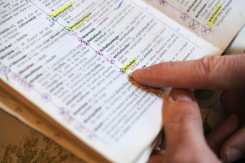○NEWS
Many languages use similar sounds for common objects
日常語では多くの言語で、類似の言語音
[AFP 9/13]
Nearly two thirds of the world's languages often use similar sounds for common objects, such as the n sound for nose, international researchers said Monday.
世界の言語の3分の2近くで、日常的なものを言い表すのに、例えばnoseのnの音のように類似した音が使われている事例が多くみられると国際研究チームが12日、発表した。
The study challenges a long-standing principle of linguistics, which holds that the relationship between sound and meaning is completely arbitrary, said the report in the Proceedings of the National Academy of Sciences.
全米科学アカデミー会報に掲載された論文によれば、音声と意味との間の関係は完全に無作為的だと考える説が、言語学の原則として長年支持されているが、今回の研究はこの説に異議を唱える。
These sound symbolic patterns show up again and again across the world, independent of the geographical dispersal of humans and independent of language lineage, said Morten Christiansen, professor of psychology at Cornell University.
There does seem to be something about the human condition that leads to these patterns. We don't know what it is, but we know it's there, added Christiansen, director of Cornell's Cognitive Neuroscience Lab.
コーネル大のクリスチャンセン教授は、「これらのパターンを発生させる、人の状態に関する何かが、実際に存在しているように思われる。それが何かは分からないが、存在していることは分かる」と続けた。
For the study, scientists analyzed dozens of basic vocabulary words in 62 percent of the world's more than 6,000 current languages.
Pronouns, body parts, animals, adjectives and verbs to describe motion were all included.
今回の研究では、世界で現在使用されている6000種類以上の言語の62%を対象に、数十の基本単語を分析。分析対象の単語には、代名詞、体の部位、動物、形容詞、動作を表す動詞などが含まれていた。
Not all, but a considerable proportion of the 100 basic vocabulary words have a strong association with specific kinds of human speech sounds, said the study.
For instance, in most languages, the word for nose was likely to include the sounds neh or the oo sound, as in ooze, it said.
The word for tongue was likely to have 'l' -- as in 'langue' in French.
The word for sand was likely to include the s sound.
R sounds were likely to included in the words for red and round.
It doesn't mean all words have these sounds, but the relationship is much stronger than we'd expect by chance, Christiansen said.
Some of the strongest associations were among words for body parts.
最も強い関連性の一部は、体の部位を表す単語にみられたという。
More research is needed to understand why certain sounds are linked to certain words.
Co-authors on the study came from the University of Zurich, University of Leiden, Max Planck Institute for the Science of Human History, and University of Leipzig.
********************
○基礎3
L-072 The most exciting event in the whole summer 夏の一番楽しいイベント
Can-do 1日の生活や日課について話せる
午前中、食べ物の準備をしました。それからお昼前に集合しました。3時までバーベキューを楽しみました。
In the morning, we prepared food.
 /english/phrase/99551?m=1
/english/phrase/99551?m=1
Then, we got together before noon.
 /english/phrase/99552?m=1
/english/phrase/99552?m=1
We enjoyed barbecue till three o’clock.
 /english/phrase/99553?m=1
/english/phrase/99553?m=1
GRAMMAR 比較表現(最上級)
夏全体で一番楽しいイベントでした。
It was the most exciting event in the whole summer.
この例文のようにexcitingなど少し長めの形容詞の場合は「比較級-er、最上級-est」の代わりに、more exciting,the most excitingのように言います。特に「いちばん~」という表現では後ろに「どの範囲でいちばんか」を表す表現がきます。
Ex, I am the tallest in my class.
 /index.php?flow=enTest_select&prid=227&mode=fromJapanese&number=5&bp=8&m=1
/index.php?flow=enTest_select&prid=227&mode=fromJapanese&number=5&bp=8&m=1



ありがとうございます❗️
また頑張ります😊宜しくお願いします😃